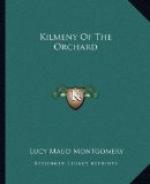She assimilated the ideas in the books they read, speedily, eagerly, and thoroughly, always seizing on the best and truest, and rejecting the false and spurious and weak with an unfailing intuition at which Eric marvelled. Hers was the spear of Ithuriel, trying out the dross of everything and leaving only the pure gold.
In manner and outlook she was still a child. Yet now and again she was as old as Eve. An expression would leap into her laughing face, a subtle meaning reveal itself in her smile, that held all the lore of womanhood and all the wisdom of the ages.
Her way of smiling enchanted him. The smile always began far down in her eyes and flowed outward to her face like a sparkling brook stealing out of shadow into sunshine.
He knew everything about her life. She told him her simple history freely. She often mentioned her uncle and aunt and seemed to regard them with deep affection. She rarely spoke of her mother. Eric came somehow to understand, less from what she said than from what she did not say, that Kilmeny, though she had loved her mother, had always been rather afraid of her. There had not been between them the natural beautiful confidence of mother and child.
Of Neil, she wrote frequently at first, and seemed very fond of him. Later she ceased to mention him. Perhaps—for she was marvellously quick to catch and interpret every fleeting change of expression in his voice and face—she discerned what Eric did not know himself—that his eyes clouded and grew moody at the mention of Neil’s name.
Once she asked him naively,
“Are there many people like you out in the world?”
“Thousands of them,” said Eric, laughing.
She looked gravely at him. Then she gave her head a quick decided little shake.
“I do not think so,” she wrote. “I do not know much of the world, but I do not think there are many people like you in it.”
One evening, when the far-away hills and fields were scarfed in gauzy purples, and the intervales were brimming with golden mists, Eric carried to the old orchard a little limp, worn volume that held a love story. It was the first thing of the kind he had ever read to her, for in the first novel he had lent her the love interest had been very slight and subordinate. This was a beautiful, passionate idyl exquisitely told.
He read it to her, lying in the grass at her feet; she listened with her hands clasped over her knee and her eyes cast down. It was not a long story; and when he had finished it he shut the book and looked up at her questioningly.
“Do you like it, Kilmeny?” he asked.
Very slowly she took her slate and wrote,
“Yes, I like it. But it hurt me, too. I did not know that a person could like anything that hurt her. I do not know why it hurt me. I felt as if I had lost something that I never had. That was a very silly feeling, was it not? But I did not understand the book very well, you see. It is about love and I do not know anything about love. Mother told me once that love is a curse, and that I must pray that it would never enter into my life. She said it very earnestly, and so I believed her. But your book teaches that it is a blessing. It says that it is the most splendid and wonderful thing in life. Which am I to believe?”




